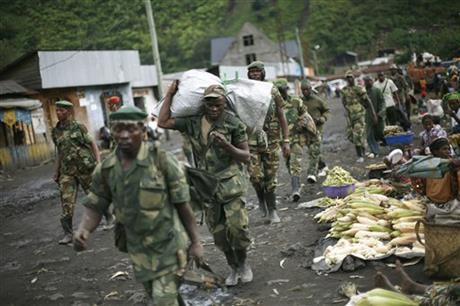
By SALEH MWANAMILONGO and JOSEPH KAY
FILE – In this Nov. 30, 2012 file photo, M23 rebels withdraw from the Masisi and Sake areas in the eastern Congo town of Sake, some 27 kms west of Goma, Congo. A leader of the M23 rebel group in eastern Congo said Tuesday, Nov. 5, 2013 that his movement is ending its rebellion after more than a year and a half of fighting against the Congolese government. The announcement came as the Congolese military declared victory over the rebels, having seized control of the last two hills that had been held by M23. (AP Photo/Jerome Delay, File)
Congo Fighting
FILE – In this Nov. 30, 2012 file photo, M23 rebels withdraw from the Masisi and Sake areas in the eastern Congo town of Sake, some 27 kms west of Goma, Congo. A leader of the M23 rebel group in eastern Congo said Tuesday, Nov. 5, 2013 that his movement is ending its rebellion after more than a year and a half of fighting against the Congolese government. The announcement came as the Congolese military declared victory over the rebels, having seized control of the last two hills that had been held by M23. (AP Photo/Jerome Delay, File)
Prev
1 of 2
Next
GOMA, Congo (AP) — A leader of the M23 rebel group in eastern Congo said Tuesday his movement is ending its rebellion after more than a year and a half of fighting as the Congolese military seized the last two hills that had been held by the fighters.
The group will seek to resolve its grievances through “political means only,” said M23 President Bertrand Bisimwa in a statement released early Tuesday.
Bisimwa ordered M23 rebel commanders to “prepare troops for the process of disarmament, demobilization and social reintegration on terms to be agreed upon with the Congolese government.”
Congolese government spokesman Lambert Mende declared victory over the rebels, and said that about 100 had been captured by government forces. M23 leader Sultani Makenga and other high-ranking officials within the movement are now on the run, he said.
The dramatic developments Tuesday came after the Congolese military backed by United Nations forces stepped up its offensive against the rebels last month as peace talks once again stalled. The Congolese military rapidly seized control of more than a half dozen towns in just a matter of days, and Mende said Tuesday they had finally recaptured the last two remaining rebel areas of Chanzu and Runyonyi.
Residents of Goma, a city of 1 million people that the M23 briefly overtook one year ago, expressed cautious optimism that the end of M23 could stabilize the area wracked by a myriad of rebel groups and militias.
“That they put down their arms and stopped fighting is a good thing. We are liberated but I’m not sure it’s the end of the M23,” said Diane Wamahoro, a 20-year-old waitress.
Analysts have cautioned that M23 is only the latest reincarnation of discontent among ethnic Tutsis in eastern Congo, and warned that other groups could emerge from its demise. M23 is widely believed to have received military and financial support from the government of neighboring Rwanda, whose president is also an ethnic Tutsi. Rwanda denies having aided the rebels despite evidence laid out in a report by a United Nations group of experts.
United States envoy to Congo Russ Feingold welcomed the M23 announcement Tuesday, saying it was a “critical and exciting step in the right direction.”
Feingold received the news while meeting with a group of journalists in Pretoria, where the South African government was hosting an international meeting on peace efforts in Africa’s Great Lakes region.
He said the Congolese government should now commit to ceasing military activity and disarming and demobilization should commence.
“Despite the bumps in the road, this is an important step in the right direction,” he said. “Everybody has to keep their commitments.”
Feingold said rebels should be protected once they disarm so that they are not left vulnerable to other armed groups. But those guilty of “serious crimes” should not get amnesty, he said.
M23 launched its movement in April 2012, accusing the government of failing to live up to its end of the bargain on a March 23, 2009 peace agreement. The rebels briefly seized control of Goma, a city of 1 million people, in November 2012 before retreating under international pressure.
In the aftermath of the Goma siege, internal divisions mounted within M23. The group was substantially weakened after its leader Bosco Ntaganda turned himself in to face charges at the International Criminal Court earlier this year.



